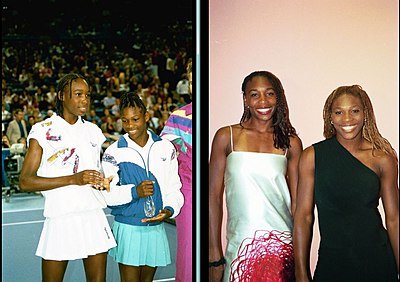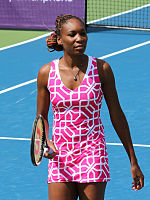|
Williams sisters
The Wiliams sisters are two professional American tennis players: Venus Williams (b. 1980), a seven-time Grand Slam title winner (singles), and Serena Williams (b. 1981), twenty-three-time Grand Slam title winner (singles), both of whom were coached from an early age by their parents Richard Williams and Oracene Price. The Williams sisters partake in “one of the elite ‘country club’ sports in America,” a sport that wasn’t—along with many others—open to female participation in the past (Smith & Hattery, 75).[1] Their remarkable achievements in tennis are comparable to those seen by men, despite women’s involvement in sports as something unusual when compared to the former regulations within sports. When the sport was introduced as a form of leisurely activity in the United States, “many clubs would not allow women to be members” (Smith & Hattery, 76). Thus, the success of the Williams sisters is one that’s astonishing to the United States both professionally and socially. Both sisters have been ranked by the Women's Tennis Association at the world No. 1 position in both singles and doubles. In 2002, after the French Open, Venus and Serena Williams were ranked world No. 1 and No. 2 on singles, respectively, marking the first time in history that sisters occupied the top two positions. On 21 June 2010, Serena and Venus again held the No. 1 and No. 2 rankings spots in singles, respectively, some eight years after first accomplishing this feat. At the time, Serena was three months shy of her 29th birthday and Venus had just celebrated her 30th birthday. There was a noted professional rivalry between the sisters in singles — between the 2001 US Open and the 2017 Australian Open, they contested nine major finals. They became the first two players, female or male, to contest four consecutive major singles finals, from the 2002 French Open to the 2003 Australian Open; Serena famously won all four to complete the first of two "Serena Slams" (non-calendar year Grand Slams). Between 2000 and 2016, they collectively won 12 Wimbledon singles titles (Venus five, and Serena seven). Nonetheless, they remain very close, often watching each other's matches in support, even after one of them had been knocked out of a tournament. By winning the 2001 Australian Open doubles title, they became the fifth pair of women to complete the career Grand Slam in doubles, and the first pair to complete the career Golden Slam in doubles. At the time, Venus and Serena were only 20 and 19 years old, respectively. Since then, they went on to add another two Olympic gold medals at the 2008 Beijing Olympics and the 2012 London Olympics. Moreover, the duo achieved a non-calendar year Grand Slam in doubles between 2009 Wimbledon and 2010 Roland Garros, which made them the co-No. 1 doubles players on 7 June 2010. Their last major doubles title came at the 2016 Wimbledon Championships. Both players won four gold medals at the Olympics, one each in singles and three in doubles— all won together— the most of any tennis players. Venus also won a silver in mixed doubles at the 2016 Rio Olympics. As a duo, they completed the double career Golden Slam in doubles. Between the two of them, they have completed the Boxed Set, winning all four major events in singles, women's doubles, and mixed doubles; they split the four mixed doubles titles in 1998.
Team competition finals: 1 (1 titles)
Performance timelinesWomen's doubles
(W) winner; (F) finalist; (SF) semifinalist; (QF) quarterfinalist; (#R) rounds 4, 3, 2, 1; (RR) round-robin stage; (Q#) qualification round; (P#) preliminary round; (DNQ) did not qualify; (A) absent; (Z#) Davis/Fed Cup Zonal Group (with number indication) or (PO) play-off; (G) gold, (S) silver or (B) bronze Olympic/Paralympic medal; (NMS) not a Masters tournament; (NTI) not a Tier I tournament; (P) postponed; (NH) not held; (SR) strike rate (events won / competed); (W–L) win–loss record.
To avoid confusion and double counting, these charts are updated at the conclusion of a tournament or when the player's participation has ended.
Note: Serena Williams did not play at the 2004 Olympics because of injury. Venus partnered with American Chanda Rubin and lost in the first round to eventual gold-medalists Sun Tiantian and Li Ting. Boycott of the Indian Wells OpenDuring the 2001 Indian Wells Open tournament in Indian Wells, California, Venus Williams withdrew four minutes prior to her semifinal match with her sister Serena.[2] The following day, Serena played Kim Clijsters in the final. As Richard Williams and Venus made their way to their seats, the crowd booed, and some spectators yelled verbal jabs.[2] Serena was booed often during the match, which she won 4–6, 6–4, 6–2, and the booing continued into the presentation ceremony.[2] Richard accused the crowds at Indian Wells of overt racism, saying, "The white people at Indian Wells, what they've been wanting to say all along to us finally came out: 'Nigger, stay away from here, we don't want you here'". When Venus was asked about her father's statements, she said, "I heard what he heard."[2][3] Oracene Price (mother and coach of Venus and Serena) accused the crowd of "taking off their hoods".[4] Effects and criticismAfter the initial controversy, neither Williams sister played the tournament in Indian Wells for 14 years. The Women's Tennis Association currently classifies the Indian Wells tournament as a Premier Mandatory event for all eligible players.[2] Exceptions are made when players engage in tournament promotions, but Venus and Serena both declined to promote the tournament; WTA Tour CEO Larry Scott agreed he would not, promotionally, "put them in a position that is going to be awkward", and tournament director Charlie Pasarell has stated he would accept the WTA tour's ruling.[2] Allegations had been made before Venus's withdrawal that Richard Williams decided who won the matches between his daughters.[5] Those allegations continued and increased as a result of her withdrawal.[2] Richard has said that racial epithets were used against him and Venus as they sat in the stands during the final.[6] Serena discusses what happened in her view at Indian Wells in detail in an entire chapter titled "The Fiery Darts of Indian Wells" in her 2009 autobiography, On the Line. She says that on the morning of the semifinal, Venus told the tour trainer that she had injured her knee and didn't think she could play and tried for hours to get approval from the trainer to withdraw, but the tournament officials kept stalling.
However, on February 3, 2015, Serena Williams wrote an exclusive column for Time magazine stating her intentions to return to Indian Wells for a tournament on March 9, 2015. She did indeed return and won her opening match.[7] Williams withdrew before her semi-final match with Simona Halep because of a knee injury.[8] The WTA announced on January 27, 2016, that Venus would return to Indian Wells for the first time in 15 years.[9] Best result in Grand Slam singles (combined)
(W) winner; (F) finalist; (SF) semifinalist; (QF) quarterfinalist; (#R) rounds 4, 3, 2, 1; (RR) round-robin stage; (Q#) qualification round; (DNQ) did not qualify; (A) absent; (NH) not held; (SR) strike rate (events won / competed); (W–L) win–loss record.
To avoid confusion and double counting, these charts are updated at the conclusion of a tournament or when the player's participation has ended.
(W) Won tournament: final contested by the Williams sisters.
Year-end WTA ranking
See also
References
Further reading
|
|||||||||||||||||||||||||||||||||||||||||||||||||||||||||||||||||||||||||||||||||||||||||||||||||||||||||||||||||||||||||||||||||||||||||||||||||||||||||||||||||||||||||||||||||||||||||||||||||||||||||||||||||||||||||||||||||||||||||||||||||||||||||||||||||||||||||||||||||||||||||||||||||||||||||||||||||||||||||||||||||||||||||||||||||||||||||||||||||||||||||||||||||||||||||||||||||||||||||||||||||||||||||||||||||||||||||||||||||||||||||||||||||||||||||||||||||||||||||||||||||||||||||||||||||||||||||||||||||||||||||||||||||||||||||||||||||||||||||||||||||||||||||||||||||||||||||||||||||||||||||||||||||||||||||||||||||||||||||||||||||||||||||||||||||||||||||||||||||||||||||||||||||||||||||||||||||||||||||||||||||||||||||||||||||||||||||||||||||||||||||||||||


